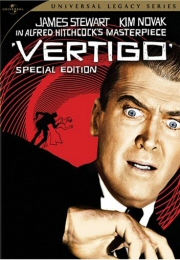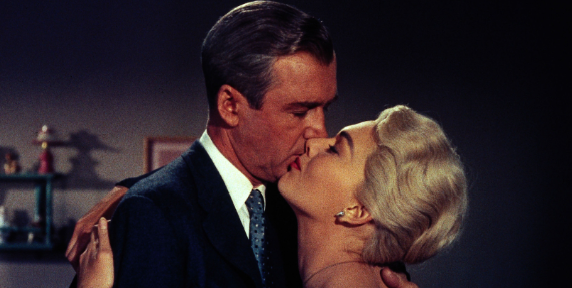 “Psycho” and “The Birds” launched the modern horror film; “The 39 Steps” helped set the pattern for espionage thrillers; and “North by Northwest” created a template for action movies that lasts to this day. Nevertheless, shot for shot, no Alfred Hitchcock production has been copied as much as the stylistically visionary and deeply emotional “Vertigo.” This romantic-psychological thriller with gothic overtones is easily the most haunting and disturbing picture in the entire Alfred Hitchcock catalog. Traces of it can be seen in everything from “Basic Instinct” to David Lynch’s “Mulholland Drive,” and countless other thrillers.
“Psycho” and “The Birds” launched the modern horror film; “The 39 Steps” helped set the pattern for espionage thrillers; and “North by Northwest” created a template for action movies that lasts to this day. Nevertheless, shot for shot, no Alfred Hitchcock production has been copied as much as the stylistically visionary and deeply emotional “Vertigo.” This romantic-psychological thriller with gothic overtones is easily the most haunting and disturbing picture in the entire Alfred Hitchcock catalog. Traces of it can be seen in everything from “Basic Instinct” to David Lynch’s “Mulholland Drive,” and countless other thrillers.
The last of four films pairing Hitchcock with James Stewart, “Vertigo” opens with a stylized rooftop chase in which Stewart’s Det. John “Scottie” Ferguson learns the hard way that he has a deep-seated fear of heights. With a police officer dead, the remorseful but well-heeled Ferguson quits the force and becomes a mildly disturbed gentleman of leisure, spending most of his time trying to figure out how to lose his fear of heights, and hanging out with his pretty, bespectacled artist friend and one-time fiancée, Midge (Barbara Bel Geddes). Though she clearly still carries the torch for her “Johnny-boy,” Ferguson won’t give her the time of day romantically. Not troubled enough.
 Seemingly out of the blue, Ferguson hears from Gavin Elster (Tom Helmore), an old college acquaintance who has some unusual concerns about his wife, Madeleine (Kim Novak). She is behaving oddly and he intimates that she may be possessed by the spirit of a long-dead woman. Rather than suggesting an immediate psychological evaluation for both husband and wife, Ferguson reluctantly agrees to keep tabs on Mrs. Elster. Following the beautiful woman, he becomes enthralled, even as the icy blonde jumps into the cold waters of San Francisco Bay. Bringing her to his apartment to sleep off her spell, naked and in his bed, the detective falls for the tortured young woman and she eventually reciprocates. The romance ends tragically, but it doesn’t stop there.
Seemingly out of the blue, Ferguson hears from Gavin Elster (Tom Helmore), an old college acquaintance who has some unusual concerns about his wife, Madeleine (Kim Novak). She is behaving oddly and he intimates that she may be possessed by the spirit of a long-dead woman. Rather than suggesting an immediate psychological evaluation for both husband and wife, Ferguson reluctantly agrees to keep tabs on Mrs. Elster. Following the beautiful woman, he becomes enthralled, even as the icy blonde jumps into the cold waters of San Francisco Bay. Bringing her to his apartment to sleep off her spell, naked and in his bed, the detective falls for the tortured young woman and she eventually reciprocates. The romance ends tragically, but it doesn’t stop there.
Based on a novel by Pierre Boileau and Thomas Narcejac, and with a sharply minimalist screenplay mostly written by Samuel Taylor, “Vertigo” is undoubtedly Alfred Hitchcock’s most beautiful and visually elaborate film, and also something of a departure. Instead of his usual crisply written comic thrillers, this is a Technicolor rendering of the kind of dark tale of crime and obsessive love that could almost have been filmed as one of the moody, black and white film noirs of the late ‘40s and early ‘50s – a fairly gritty style somewhat opposed to the more artificial Hitchcockian ethos. Released during a time when featherweight sex comedies and biblical epics were among the most popular fare, it’s no surprise that “Vertigo” was not a hit on its initial release. However, the same qualities that made it a hard sell in 1958 have turned it into the favorite Hitchcock classic of both the cinephile crowd and many a filmmaker.
Originally photographed in the large format VistaVision process and restored in 1996 for a 70mm theatrical release, San Francisco has never looked more beautiful than it does in “Vertigo.” Still, while flowers often fill the screen, this is not a picture postcard film. Hitchcock and the great cinematographer Robert Burks are giving us a dream of rapture and terror, and the emphasis is on terror. A short but unforgettable dream sequence created by graphic design great Saul Bass makes this even more apparent. Similarly, the often-copied high-romantic score by Bernard Herrmann, arguably the greatest of all film composers, is a crucial part of a movie that is deliberately “under-written” – dialogue is largely dispensed with and Hermann’s music fills in the gaps.
Hitchcock often joked about treating actors badly, but his use of them here couldn’t have been better. Though at first you might think she’s underplaying her role, Kim Novak is at her absolute best, wordlessly capturing longing, great sadness, and lord-knows-what else in her still, brown eyes. James Stewart, whose everyman persona grew persistently darker after his return from his service in World War II, outdoes himself in probably his most complicated role, which calls for him to be alternately likable, depressed, obsessive and eventually borderline psychotic. In the role of the sadly ignored Midge, Barbara Bel Geddes is heartbreaking. Hitchcock made a lot of love stories, but few were as honest about the price of love as “Vertigo.”
Though it’s the work of the one greatest directors of all time working at the very top of his game, the precise reasons for the power of “Vertigo” are hard to describe. Every shot seems to be suffused with a melancholy quality that can’t be explained rationally. It’s a cliché to call this Hitchcock’s most personal film, because it probably is. In any case, I’ll resist the urge to play cineaste shrink – lots of writers already have. I will add that readers of Donald Spoto’s classic, controversial biography, “The Dark Side of Genius,”can find plenty to think about in regards to this one.
For all of my raving, not to mention the five-star rating I give it, “Vertigo,” is actually not quite my all-time favorite Hitchcock film. I personally prefer his more straightforwardly humanistic, but no less artistically mature, classics of suspense: “Rear Window,” “Notorious,” and the poignant “Shadow of a Doubt.” Even so, “Vertigo” possesses qualities those other films lack. It tests our patience, but then rewards it, not only with beauty and terror, but also with an emotional sucker punch that has yet to be equaled.
5 / 5 Stars
Starring: James Stewart, Kim Novak, Barbara Bel Geddes, Tom Helmore, Henry Jones, Raymond Bailey, Ellen Corby
Director: Alfred Hitchcock
Theatrical Release Date: May 28, 1958
Universal Legacy Series DVD Review:
The amazing visual quality of this newly remastered DVD is reason enough to justify this release, but the extras in this Universal Legacy edition also offer some real value – even if some of the extras are mixed blessings. Left over from prior DVD releases, we have a fact-filled but fairly dry commentary on the 1996 restoration from ace film preservationists Robert Harris and James C. Katz, as well as Hitchcock’s long-time producing right hand, Herbert Coleman. We also have a late ‘90s AMC documentary on the film and its restoration narrated by the late Roddy McDowell, as well as a moody new ending (really a moody coda to the present ending) created for foreign censorship.
New for this DVD, there is another of the excellent series of newly created DVD extra documentaries that Universal has been adding to its recent Hitchcock reissues. Actually, in this case, it’s a set of mini-docs on some of the master’s most crucial collaborators, including composer Bernard Herrmann, animator and graphic designer Saul Bass, legendary costumer Edith Head (a not so coincidental dead ringer for Edna Mode of “The Incredibles”) and, most crucially of all, onetime screenwriter Alma Reveille, a.k.a., Mrs. Alfred Hitchcock. In addition, there is a new commentary from the ever-voluble William Friedkin. Unfortunately, the skilled director of “The Exorcist” and “The French Connection” has an annoying habit of simply narrating the story and repeating obviously visible details. Much more worthwhile (and immensely shorter) is an audio excerpt, accompanied by a montage of clips, from Hitchcock’s legendary 1962 interview with critic and world class director François Truffuat. Finally, “The Case of Mr. Pelham,” an episode of “Alfred Hitchcock Presents” directed by Hitchcock and starring Tom Ewell (“The Seven-Year Itch”) is also included.


